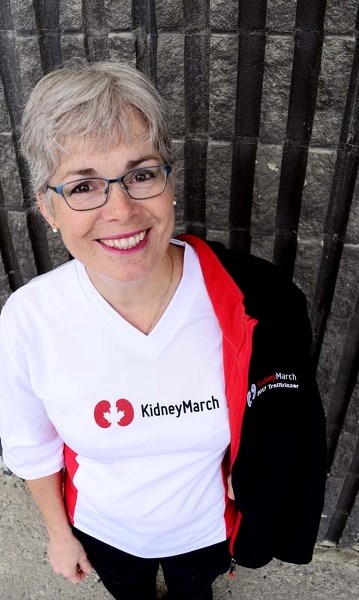For many who work in the field of health care, giving back extends far beyond the realm of nine to five.
This is the case for nursing attendant Marie-Linda Plante, who is ramping up once again for the annual Kidney March this Sept. 8-10 as she works toward raising the minimum $2,300 required to take part in the three-day 100 km walk.
“You never know if one day it will happen to you or a friend, a family member, a neighbour …” said Plante, who works at the Northwest Calgary Hemodialysis clinic in Calgary and also has her own respite, home and companion care business TTOGETHER.
“This is very close to my heart ... the only cure is a transplant and even then you’re crossing your fingers every day,” said the nine-year-long Cochrane resident.
“Last September I walked every step of the 100 km. I was only halfway through and I knew that I was going to walk again in 2017.”
Plante, who walked last year after fundraising $2,500, is hosting a garage sale at her 2 West Broach Place residence on May 5-7 from 8 a.m.-9 p.m. where all the proceeds will go toward her walk.
She is also selling raffle tickets for a 50/50 draw that will be drawn on Aug. 30. Tickets are $5/each or 3/$10 or 10/$20; tickets will be available at her garage sale.
Plante said the clinic she has worked at for the last eight years provides dialysis care for 57 patients who come every second day for a four-hour stay at a time. Currently eight of these patients are from Cochrane and Morley areas.
“We become close to our patients … we know so much about them and sometimes more than their close family members,” she explained. “Every patient has their own story and everyone has a sad story.”
Former Eagle publisher, Jack Tennant, is one of Plante’s patients and one of those stories.
Tennant was diagnosed with kidney failure four years ago, a common eventuality of life as a Type 2 diabetic.
“Marie-Linda is such a great, positive influence around everybody there,” said Tennant.
“It’s one of these things that doesn’t get better on its own … people like her come along and give you so much confidence.”
A lifelong storyteller through his candid and sometimes controversial columns and his work as a journalist has transcended through to his own dialysis treatments at the clinic.
There he speaks with fellow dialysis patients and learns their stories – such as a 23-year-old girl who was recently diagnosed with kidney failure and is now receiving dialysis.
Tennant said while he can accept his own diagnosis at 81 years of age, it’s difficult to watch young people with their entire lives ahead of them be dealt a difficult hand.
Most people die waiting for a new kidney – due to the inability to receive a transplant or match incompatibility.
Some patients grow weary of receiving dialysis, said Plante. Often it’s their families and close friends who keep instilling the will to go on. Once they give up, they die within a short period of time.
“It’s not their choice – their only choice is to go for dialysis or die.”
Kidney disease may be the result of a host of issues – from autoimmune and genetic diseases to diabetes, heart disease or illegal drug use and abuse.
Plante has assisted all walks of patients – from youth to seniors.
She recalls one patient who lost her kidneys after giving birth to her third child; a 30-year-old firefighter was had been on dialysis for half his life; a set of twin brothers who each had to receive dialysis treatment.
All too often Plante said it’s young people with families of their own and full-time day jobs with bills to pay.
Once Chronic Kidney Disease (CKD) develops into end stage renal disease, dialysis is required to prevent water, salt and waste from building up in the body, according to the National Kidney Foundation.
There are two types of dialysis: hemodialyis, where an artificial kidney or hemodialyzer is used to remove the buildup in the body and peritoneal, where your blood is cleaned inside your body by way of a catheter.
Dialysis will not cure kidney disease, it only does the work of healthy kidneys.
Dialysis is a treatment required throughout one’s life, unless the patient receives a transplant.
For tickets or to donate to Plante’s cause, get in touch with her at 403-981-8008.




